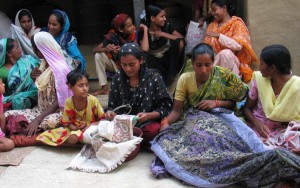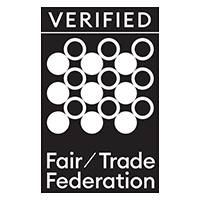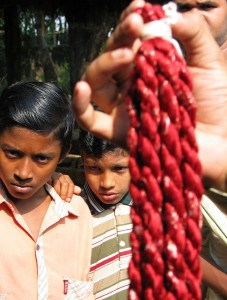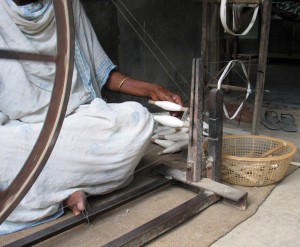Oppression and Slavery in Today's Textile Industry
Consumers beware: if you knew exactly how that cheap item of clothing was made you would probably think twice. Behind that bargain item could be atrocious conditions, sometimes even slave labor. Many examples of abysmal conditions in the textile industry including forced labor highlight the extremes of an entire spectrum of inhumane conditions. These examples have shown up in every continent and in a long list of countries.

A group of artisans using traditional embroidery techniques. Sevya supports traditional practices in production for the fair trade wholesale and retail markets.
A recent case in point is particularly poignant. An article published on infosurhoy.com on May 24, 2013 refers to the announcement by Brazil's Public Ministry of Labor (MPT) that the textile industry is among the top three culprits in forcing immigrants to Brazil into slave-like conditions. Sadly, this story has many correlates in various places in the world. Incidences of forced servitude in textile production are well documented in Pakistan, Bangladesh and India, for instance. In 2007 a famous cheap fashion giant was forced to account for revelations of abbysmal conditions amounting to slavery in certain suppliers for its clothing lines. Ironically, forced child labor was indicated in evidence addressed in what became a major source of shame (but limited accountability) for this organization.
Some attest that companies that outsource to countries such as India, Pakistan and Bangladesh are providing valuable jobs to impoverished areas, so they should be applauded regardless of proven terrible working conditions. According to such sources, these companies are not aware of the conditions of each and every one of their many streams of production. But the truth is that these companies certainly are aware that these conditions come with the territory when they expect goods made at the utterly cheap price points they outsource for.
Truly fair trade clothing offers an alternate route. In order to earn fair trade certification, producers must meet strict requirements that are monitored by the certifying body. For example, in the U.S. the Fair Trade Federation requires adherence to nine principles of fair trade. These nine principles are: 1) create opportunities for economically and socially marginalized producers; 2) develop transparent and accountable relationships; 3) building capacity and independence for producers; 4) promote fair trade; 5) pay promptly and fairly; 6) promote safe and empowering work conditions; 7) ensure the rights of children; 8) cultivate environmental stewardship; and, 9) respect cultural identity. If these principles are followed there is absolutely no room for abusive conditions. In fact, quite the opposite conditions can flourish. Entire communities can create sustainable, empowering livelihoods. Any organization dedicated to promoting such sustainability under Fair Trade Federation certification does so through a solid commitment to each of these fair trade principles. Sevya strives to be an exemplary model of fidelity to these principles.
Sevya takes its commitment to fair trade principles very seriously, because promoting sustainable and fair conditions for producers and their communities is very serious business. As so many examples of intolerable conditions, even slavery, continuously emerge in the news our commitment continues to grow. We hope to inspire consumers to think of the effects of their purchases, and to seek out fair trade options wherever possible. Fair trade provides a measurable, accountable means for consumers to see positive effects for their retail and wholesale fair trade purchases.
If you are undecided as to the importance of fair trade in the textile industry, try searching the internet, media and literature available on the subject of documented labor conditions and slavery in today's textile industry. The magnitude of the problem is amplified by certain factors present in the global marketplace, weak government involvement and apathy by consumers. All of these factors can be effectively counteracted. We need to begin by considering how our purchases affect those who produce the items we buy.
Sevya offers a wide range of elegant, refined fair trade clothing, decor, jewelry, and other items. We appreciate your willingness to think about how your purchases of these fair trade items can truly help change conditions for the better.
Jerry Rasch writes for Sevya as a part-time, but whole-hearted pursuit.



